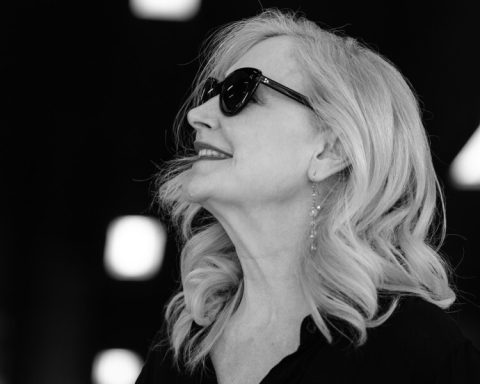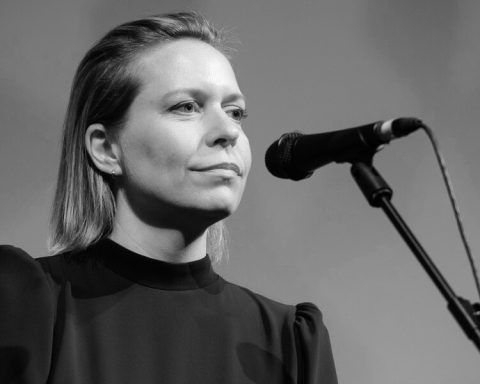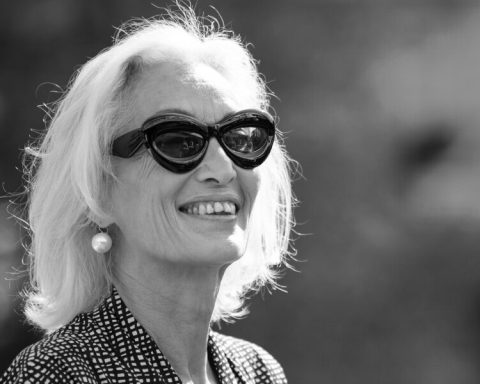Lenka Tyrpáková was born in Prague. She graduated from the Faculty of Philosophy and Arts at Charles University after studying Russian and Ukrainian. Afterwards, she studied Russian and East European Studies at the Faculty of Social Sciences. In 2005, she joined the team of the Karlovy Vary International Film Festival and has been working in the Program Department since then. She is a member of the selection committee and a programmer in charge of the films from Central and Eastern Europe and the Balkans. At KVIFF, she is also involved in the selection of the projects for the industry platform Eastern Promises. Since 2008, she has also been working as a programmer for the Prague Short Film Festival. She has served as an expert on several film commissions, including the selection panel for the Lux Prize. She is a member of the European Film Academy.
At this year’s Karlovy Vary International Film Festival, Tara Karajica talked to Lenka Tyrpáková about this year’s edition of the festival and the behind-the-scenes of the event, including the selection program.
How did you become a programmer?
Lenka Tyrpáková: Well, it’s been a while since I’ve been working for the Karlovy Vary International Film Festival. Actually, it’s my nineteenth year here – eighteenth because of COVID. But when I first started working for the festival, it was through a friend of mine who called me to tell me that they were looking for someone. I wasn’t even looking for a job. I was still a student and about to leave for Poland to write my Master’s thesis and I was like: “No, I’m not going to an interview now.” But I went to the interview, and they offered me to job of coordinator of the Variety Critics’ Choice section which, over the years, transformed into the Future Frames program that we do together with the European Film Promotion. So, I was coordinating this section and the subtitles because it was in my second or third year when we started with the electronic subtitles. I was doing the translation and taking care of this because I was also studying languages, so it all fit together. So, I never went to Poland to write my Master’s thesis. I stayed. And it’s been nineteen years! Eva Zaoralová was still the artistic director. She was a very inspiring, strong female leader. When you have this type of strong, powerful female leader, it was a really great learning experience working with her. So, little by little I was like: “Okay, I also like films,” and I started watching films. We started discussing it and, at some point, she was like: Okay, you can try and go to your first film festival.” I did East European Studies, Languages, and Cultural Politics, so I spoke Polish, Ukrainian, Russian and it became kind of natural for me to take over this region. And, step by step, I built the relationships and started traveling more. Back then, we still had the East of the West Competition, so I was taking care of this section and looking for films for this competition program. Now, I’m still in charge of Eastern Europe, but as of last year, we have the Proxima Competition, so each of us is doing pre-selection for our regions and then, we are watching all together the candidates for both competitions and the special screenings and putting the program together.
How would you define KVIFF’s artistic direction and the festival’s competition sections?
L.T.: Well, I think you can still feel a strong connection and the roots of the region, so I think we can still be defined as a kind of bridge between the East and the West. We are, of course, trying to erase the borders. I think the main Competition is made up of films that are maybe the bigger titles that can communicate with the audience. The same goes, of course, for the Proxima Competition that can be seen as a complement to the main Competition. Some parts are more more present in the Proxima Competition, which is more free thinking, with directors or auteurs who are trying to find new approaches [to filmmaking]. So, basically, that was the reason why we wanted to have Proxima, to also give a chance maybe to established directors who will try to find new ways to present films to the audience.
When programming and selecting films, can you exclude your personal taste? If so, to what extent?
L.T.: Well, I think that’s the job of the programmer! There are always two parts in you. There’s the viewer and, of course, there is a difference between what I watch at home after work and the films I watch for work. And, of course, there are so many factors that you have to take into account. You have to think about your audience. You have to think about the regions, etc. But I think that we really can put aside our subjective taste, of course. Then, there are films that you are more attached to, because I don’t know, it tickles something inside you, you felt some kind of emotion. But there are films that maybe you don’t feel that attracted to personally, but you still understand that it’s important to have this type of film for this or that reason, so I think it’s important to balance the two.
Can you talk about the selection process of the competition programs?
L.T.: There are different channels in terms of how we get the films, obviously. We are three programmers, a program coordinator and the artistic director. So, the core team is made up of five people. And we are divided by regions. So, everyone is responsible for his/her own region, being in touch with Film Institutes, producers, etc. There is also a group of reviewers. So, together, we decide about the films that we want to move further. And then, we try to see as many strong candidates in the cinema. That’s the thing that we have been doing for the past three years; we book a cinema and we go and watch films together, which really helps a lot the process of selection. We see the films at the same time, in the same space, undisturbed, and we can discuss them immediately.
What can you say about this year’s program?
L.T.: Well, I think actually, that there’s maybe a strong female element. There are a lot of pregnant female characters, strong women leads and father-daughter relationships.
What is a good film according to you?
L.T.: If I’m talking about the viewer in me, it’s a film that makes me feel something because I really like to have some kind of emotional attachment. If I’m talking about the programmer in me, it’s a film that surprises me because the more films you watch, the less you are surprised, so it’s always nice to be surprised.
The main competition is a bit male-heavy this year. Do you ever talk about the 50/50 equality when you are all selecting the films together?
L.T.: Yes, we are discussing it, but at the same time, the first thing we always think about is quality because I don’t think it’s fair to say we take this film just because the director is female. Maybe last year, it was 50/50, but because we really thought these were the strongest candidates. So, this year, maybe we only have two female directors in the main competition. But, at the same time, you have The Girls Are Alright, which is a super “female power” film. I loved it. And they did such a nice introduction to the film; they said something that really stayed with me. They said that people should realize that strength can also come from fragility. And it was like: “Wow!” Also, it was really nice that there are also two male producers involved, but they really gave the floor to the girls when they had the premiere in the Grand Hall. And the stage just belonged to the girls.
In that sense, what can you say about women in film today?
L.T.: I think it’s still too slow. And not only in films, but in festivals, too. But I think the first step was made, and that is that it’s being spoken out loud. And hopefully, you can feel that something is happening even when the progress is so slow.
Photo credits: Courtesy of Lenka Tyrpáková.
This interview was conducted at the 2023 Karlovy Vary International Film Festival.










